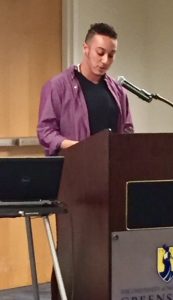Posted on 02/20/2018
WGS would like to cordially thank Dr. Marcia Ochoa, Dr. Treva Ellison and our very own Dr. Daniel Coleman Chávez for participating in “Transfeminisms,” the third presentation of our Contemporary Feminisms series, on February 7th, 2018.
Dr. Ochoa opened the panel discussion by sharing about her organization in California – El/La Para TransLatinas — which responds to issues of concern to trans persons in the Latinx community. Using the organization to conceptualize a model of citizenship for translatinas, Ochoa describes the term “translatina” as one of “coalition, of identity, meant to include actors of difference, to provide visibility and advocacy, celebrating Latin American women who may migrate to the U.S. and Europe.” Her work, “Ungrateful Citizenship,” proposes an analytical framework for citizenship based on exclusions and refusals with respect to both gender and migratory status.
Dr. Ellison’s presentation, “The Issue of Blackness,” looks at the “problem” of Black life in Los Angeles after World War II. They state, “Black queer and trans geographies mark not only the ruptures and interstices of the social and cultural projects of racial capital, but they also topographize the anti-social social that could and does often thrive in its wake. They point to both the multiple forms of appearance, of surplus people and places, the formations of fungal life that might flourish in the already decaying outcomes of theft and accumulation.”
 WGS’s esteemed Lecturer, Dr. Daniel Coleman Chávez, gave a riveting presentation titled, “Figuring Trans* Embodiment: Trace, Transfeminism and Performance.” He states, “I consider physical, energetic and spiritual human bodies as they transit in trans*ness, interfacing with axes of power, cultural practice, and discourse. Thinking with these three bodily forms, I understand embodiment as a performance of radical presence: presence wrought from the root. That is to say, moments where bodies recognize themselves as agents of their own subjectivity, always already in relation, with or without obvious publics. ‘Moments,’ because the inconsistency of access to full humanity under juridico-medical discourse lacerates the space-time continuum of trans* embodiments as social subjects, yet does not and cannot continually rid trans* bodies of agency. These ‘moments’ are recuperative and restorative performances; sometimes durational, other times ephemeral, always generative of a body archive.”
WGS’s esteemed Lecturer, Dr. Daniel Coleman Chávez, gave a riveting presentation titled, “Figuring Trans* Embodiment: Trace, Transfeminism and Performance.” He states, “I consider physical, energetic and spiritual human bodies as they transit in trans*ness, interfacing with axes of power, cultural practice, and discourse. Thinking with these three bodily forms, I understand embodiment as a performance of radical presence: presence wrought from the root. That is to say, moments where bodies recognize themselves as agents of their own subjectivity, always already in relation, with or without obvious publics. ‘Moments,’ because the inconsistency of access to full humanity under juridico-medical discourse lacerates the space-time continuum of trans* embodiments as social subjects, yet does not and cannot continually rid trans* bodies of agency. These ‘moments’ are recuperative and restorative performances; sometimes durational, other times ephemeral, always generative of a body archive.”
Thank you again to our guests for the important work they are contributing to the project of imagining a better world, where all persons are acknowledged, treated with dignity, and have equal access to basic human rights. We appreciate all those in the UNCG community who joined us as well!